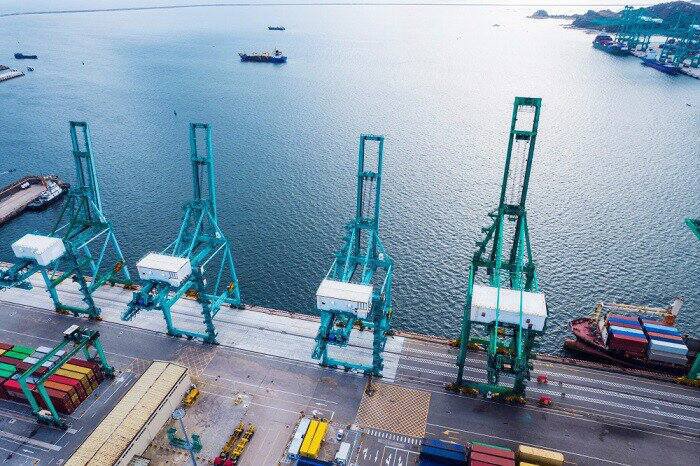
The pharmaceutical industry is essential to ensuring the timely and effective delivery of life-saving drugs to patients worldwide. It is becoming increasingly crucial to comprehend the primary factors influencing the pharmaceutical supply chain's reliance on ocean carriers in the United States as its reach expands.
This article investigates why maritime shipping has evolved into an essential part of the pharmaceutical supply chain by examining elements like sea freight rates, ocean freight tracking, ocean freight charges, and sea freight shipping.
7 Key Factors Driving the Pharmaceutical Industry's Reliance on Ocean Carriers
Globalization and Market Expansion
The pharmaceutical sector has experienced significant globalization recently as businesses have expanded across continents to access new markets. This expansion calls for a strong and effective supply chain to guarantee the accessibility of medicines in various areas. Large volumes of pharmaceutical products can be transported over great distances using ocean carriers, which are both affordable and dependable.
Cost-Effectiveness
The efficiency of maritime shipping is one of the main factors contributing to pharmaceutical companies' heavy reliance on ocean carriers. Sea freight rates are frequently less expensive when compared to other forms of transportation, like air freight. Ocean transport is frequently a financially viable option for pharmaceutical products because they have a high value-to-weight ratio. Pharmaceutical firms can reduce the costs of their supply chain by utilizing sea freight, which could ultimately result in patients being able to afford more expensive medications.
Capacity and Scalability
Regarding capacity and scalability, ocean carriers have a clear advantage. The ability to transport large quantities of medications becomes essential due to the rising demand for pharmaceutical products on a global scale, especially during the ongoing COVID-19 pandemic. Pharmaceutical companies can scale their operations effectively and adapt to market demands thanks to the ample space ocean vessels provide for large shipments.
Regulatory Compliance and Safety
Strict rules governing medication handling, storage, and transportation apply to the pharmaceutical industry, which operates in a highly regulated environment. The integrity and safety of pharmaceutical products during transit are ensured thanks to ocean carriers' significant investment in developing specialized containers and equipment that comply with these rules. Ocean freight's monitoring and tracking capabilities have also improved thanks to technological advancements, enabling real-time visibility and control over shipments, which is essential for pharmaceutical companies to maintain product quality and compliance.
Sustainability and Environmental Considerations
Businesses from all sectors, including the pharmaceutical industry, have prioritized sustainability recently. Ocean shipping is considered a more environmentally friendly mode of transportation because it produces fewer carbon emissions per unit of cargo transported than air freight. Pharmaceutical companies are choosing to ship their products via ocean carriers and adopting more environmentally friendly practices to reduce their carbon footprint and support global environmental goals
Global Reach and Connectivity
Distribution of pharmaceutical products to various markets is made easier by the extensive coverage and connectivity offered by ocean carriers to various ports worldwide. Due to their ability to access remote or underserved areas thanks to their global reach, pharmaceutical companies can ensure that patients receive their medications even in places with poor infrastructure. The expansion of the pharmaceutical industry and the availability of healthcare solutions depend on having effective connections with various markets.
Risk Mitigation and Resilience
Risks to the pharmaceutical supply chain include disruptions in transportation networks, natural disasters, and geopolitical issues. Ocean carriers make risk diversification and risk mitigation possible by providing a durable and dependable mode of transportation. Pharmaceutical firms can reduce the effects of unforeseen events and guarantee a steady supply of medications for patients by relying on various shipping routes and carriers.
Conclusion
The pharmaceutical industry heavily uses ocean carriers in the USA for reasons including cost-effectiveness, capacity, regulatory compliance, sustainability, global reach, and risk mitigation. Maritime shipping is essential in ensuring that patients worldwide have access to medications due to the growing demand for pharmaceutical products and the necessity of effective supply chain management. Ocean carriers will continue to be a crucial part of the pharmaceutical supply chain as the market grows and changes, spurring innovation and enabling better healthcare for millions.
The reliance on ocean carriers in the USA is anticipated to increase further as the pharmaceutical industry develops and grows. The elements above emphasize the critical part maritime shipping plays in ensuring that patients worldwide have access to medications. Ocean carriers are a great option for pharmaceutical companies looking for a reliable and efficient supply chain solution due to their affordability, capacity, regulatory compliance, sustainability, global reach, and risk mitigation.
You can take advantage of maritime shipping's capacity, cost-effectiveness, regulatory compliance, and global reach with FreightMango. Our sophisticated tracking systems ensure real-time visibility throughout the transportation process because we recognize how important it is for pharmaceutical products to be delivered promptly and securely. Partner with FreightMango to optimize your supply chain, improve sustainability, and ensure that patients worldwide can access life-saving medications.





 Get instant quote
and compare offers in real time
Get instant quote
and compare offers in real time